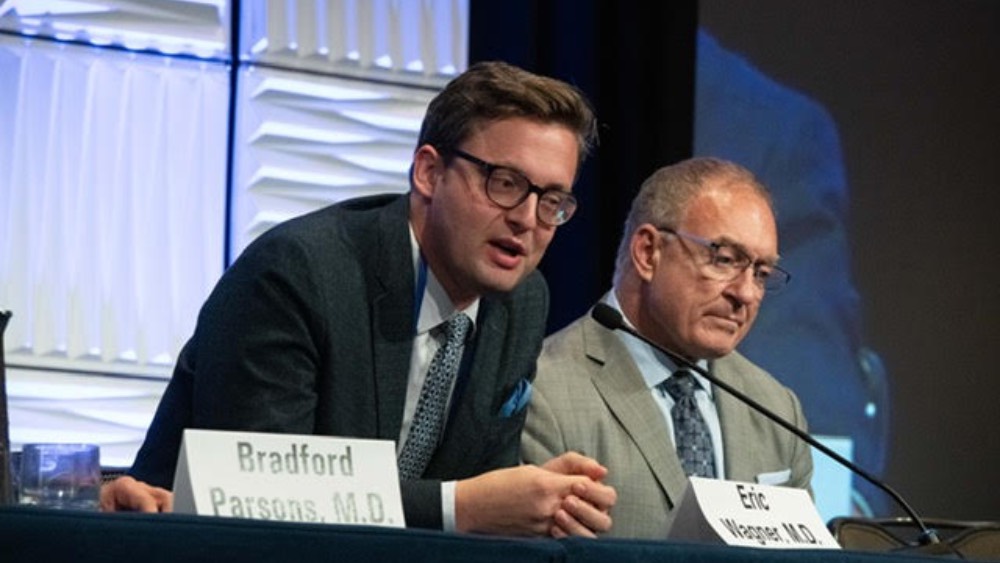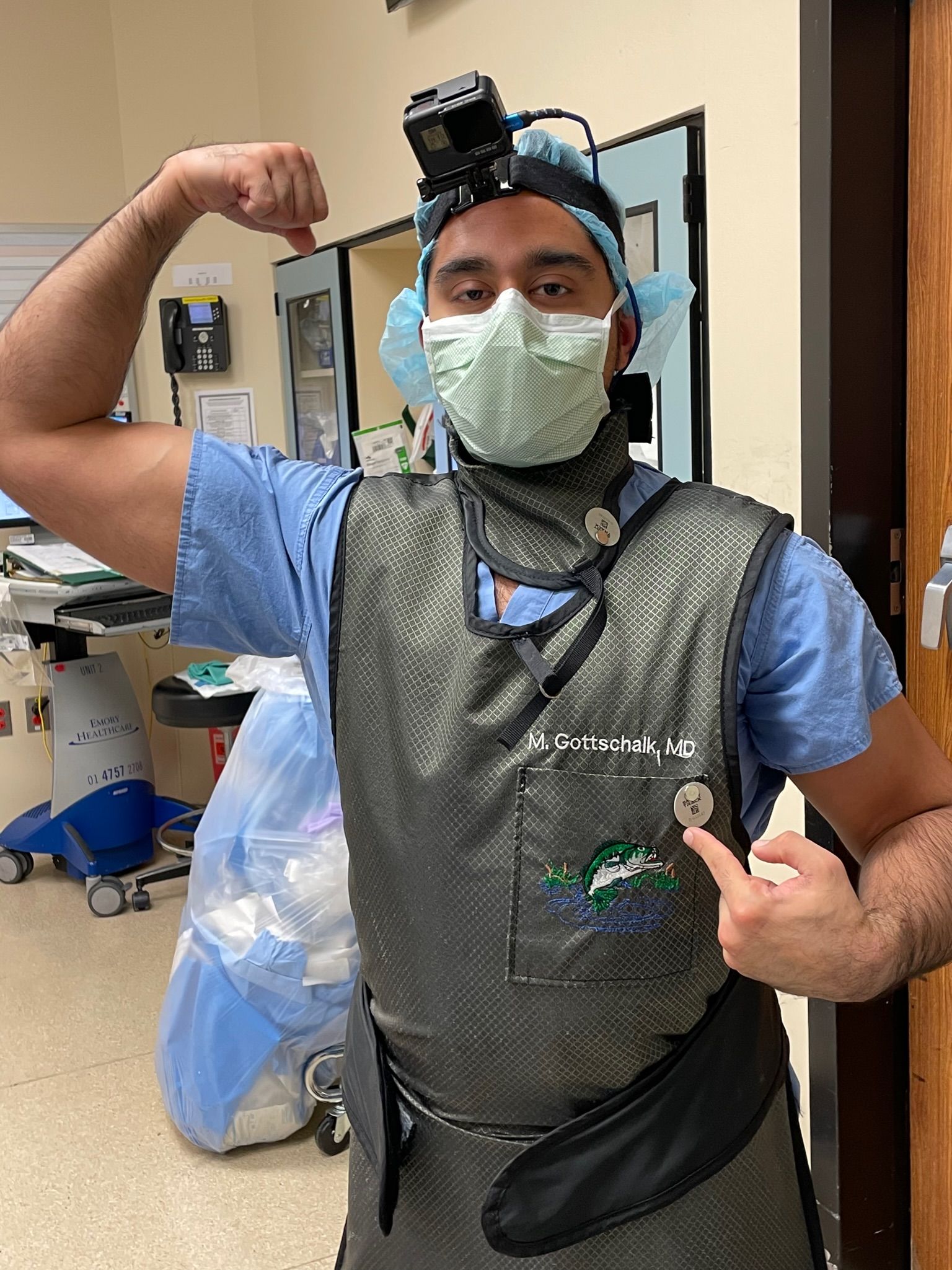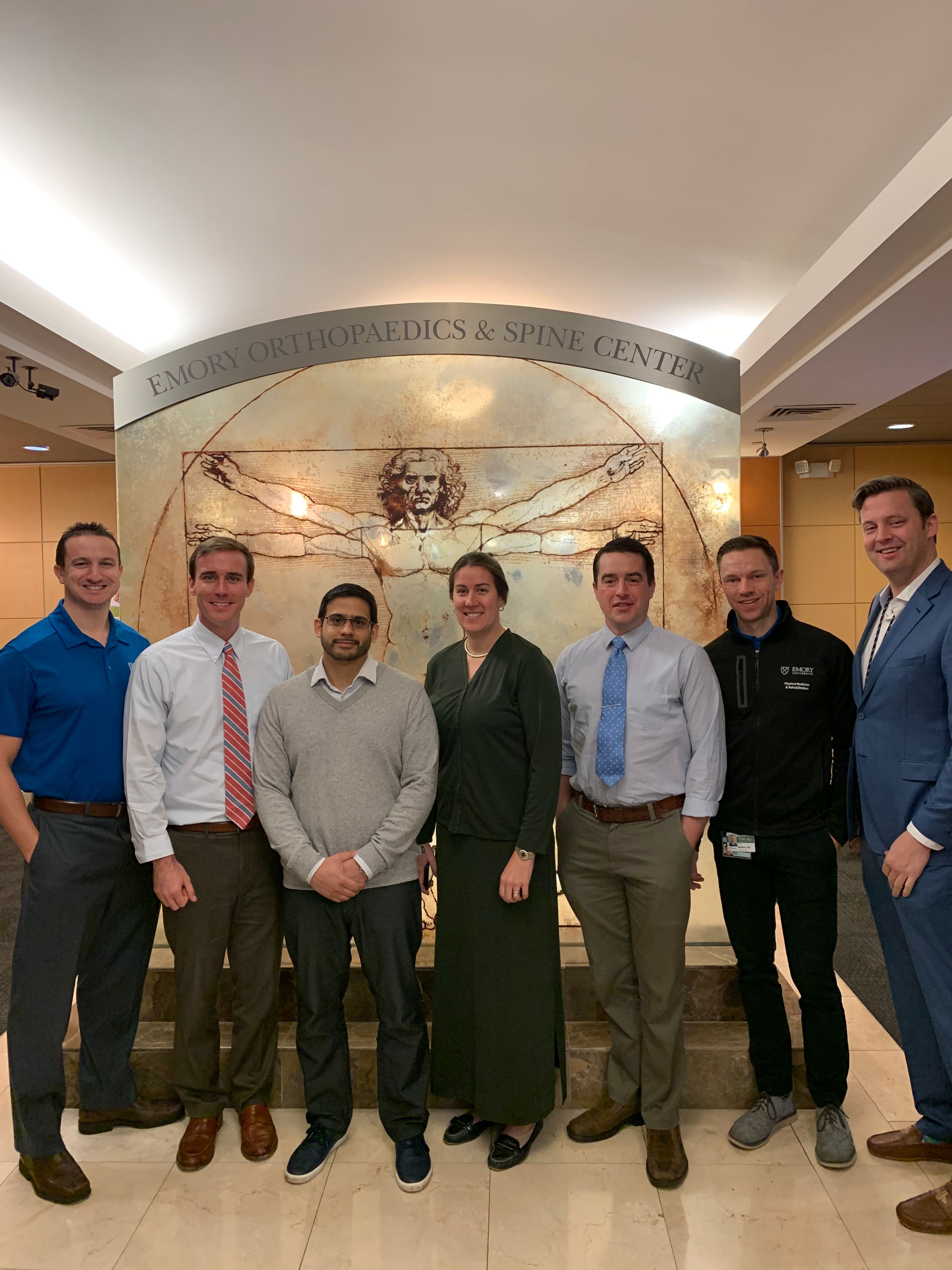The primary goal of this fellowship is to train hand and upper extremity surgeons who have been exposed to and are capable of taking the best quality care of patients with a wide diversity of upper extremity pathologies. Whether the fellows practice in private or academic settings upon graduation, they will have the skill set and foundation of knowledge to treat any patient with an upper extremity pathology.
Clinical Education
Given that the hand and upper extremity have among the most diverse sets of pathologies in any area of orthopaedic or plastic surgery, we have customized the rotation schedule and didactic experiences to provide the fellows with comprehensive exposure to every area of hand and upper extremity surgery. During the rotations with our 16 practicing hand and upper extremity surgeons, fellows will gain insight into and experience of the evaluation and surgical treatment of patients with straightforward and complex pathologies. Each year, surgeons at the Emory Upper Extremity Center, Grady, CHOA, and the private group treat 15,000 patients and perform more than 5,000 surgeries. We expect fellows to complete more than 600-700 cases in their fellowship year. The pathologies will be extremely diverse, ranging from the scapula, shoulder girdle, complex elbow and wrist, and brachial plexus to the fingertip.
Surgical Experience
The fellows operate in multiple surgical environments, including inpatient and ASCs at an academic medical center (Emory), inpatient Level 1 trauma center (Grady), inpatient and ASC associated with a children’s hospital (CHOA), and high-efficiency ASC (private). Combining the wide range of surgical environments with the enormous diversity of cases, fellows receive a uniquely comprehensive exposure to hand and upper extremity surgery. The following are examples of specific areas to demonstrate this diversity:
-
General hand surgery: every faculty member has a busy general hand surgery practice
-
Arthroplasty: shoulder, elbow, wrist, thumb, and finger joints
-
Arthroscopy: scapulothoracic, shoulder, elbow, wrist, and thumb CMC
-
Trauma: fracture and traumatic reconstructions from the shoulder girdle to fingertip
-
Microsurgery: replantation, revascularization, rotational and free flap, brachial plexus, and nerve surgery
-
Brachial plexus and nerve: brachial plexus reconstruction, CP and SCI, peripheral nerve grafts and transfers, tendon transfers, contracture releases and muscle advancements, joint arthroplasties, and fusions
-
Congenital hand surgery
- Complex Ultrasound guided procedures and injections
Fellows will take
Although not formally required by the ASSH, we feel that two of the important skill sets fellows should develop during their hand fellowship include microsurgical anastomosis and joint arthroscopy. Therefore, the fellows will undergo a week-long microsurgery course at the Mayo clinic, and a flap course led by Dr. Nicki Zelenski and Paul Ghareeb during the first week of fellowship. At the same time, the fellows will attend a UE arthroscopy course led by Dr. Eric Wagner and Nina Suh during the first week of fellowship as well.
Following this course, the fellows will then have monthly microsurgery and arthroscopy training sessions throughout the remainder of the fellowship year. These courses and sessions will complement the robust surgical experiences and techniques the fellows will benefit from during the rotations.

Didactics
Emory’s didactic educational program represents one of the areas we pride ourselves on for this fellowship. As mentioned above, fellows will attend a customized microsurgery and arthroscopy course the first week of fellowship wherein they will have no clinical or call responsibilities. There will then be weekly didactic activities throughout the remainder of the year. Every Wednesday morning, there is a complex upper extremity case conference at the Emory Upper Extremity Center, where complex cases from the past or upcoming week will be discussed along with presentations by the participating faculty members. Every Monday morning there is a research conference, while Monday evening there is a topic specific hand education conference.
Every Friday morning, the fellows will have the opportunity to participate in orthopaedic surgery grand rounds and will be asked to give a lecture of their choosing to the residents during the hand block of this educational conference. Each month, the fellows will participate in a SAE question review with Drs. Gottschalk, and Wagner during a Saturday brunch. Furthermore, there is a monthly hand and upper extremity journal club on the third Wednesday of each month where current and classic articles will be discussed with all faculty members of the fellowship. A monthly Friday evening lecture/dinner and Saturday morning Cadaver lab with national experts will allow fellows to meet experts throughout the field of hand surgery and learn from them. A quarterly city-wide case conference and journal club will provide fellows the opportunity to interface with various surgeons around the Atlanta area four times a year, as well as monthly cadaveric lab dissections. The fellows will participate in a microsurgery, flap, and upper extremity arthroscopy course at the beginning of their fellowship. Furthermore, fellows will be paid to attend the ASSH and either the AAOS or AAHS meeting the year of their fellowship.
Research
The Emory Upper Extremity Center surgeons and scientists publish more than 50 peer-reviewed articles each year. Furthermore, the post-docs, residents, fellows, and medical students who work with them present at numerous regional, national, and international conferences each year, including the ASSH, AAOS, AAHS, ASES, SECEC, ISAKOS, IFSH, and numerous other conferences.
The Emory Upper Extremity Center has multiple clinical research coordinators, research assistants, biomechanics, and translational science experts as well as other staff available to help fellows carry out any investigations they wish to complete. Furthermore, there are up to 10 clinical trials ongoing at any one time, investigating a wide diversity of upper extremity pathologies. Many of the surgeons are also involved in multicenter investigations with institutions around the country and the world. For example, Dr. Wagner has taken the lead at the ASSH and Codman Shoulder Society to spearhead each society’s international multicenter research efforts.
Our goal is to provide our
- Emory Upper Extremity Center Clinical Research: Multiple clinical research coordinators and research assistants work with Drs. Wagner, Gottschalk, and Daly to complete a variety of investigations including clinical trials, retrospective reviews, national and regional database studies, systematic reviews, technique articles, book chapters, telemedicine, and other novel technology evaluations and healthcare policy investigations. These assistants, along with the department statistician, assist fellows in performing various types of statistical analysis and other steps required for manuscript composition and submission.
- Dedicated Fellow Study Area and Workspace: There is a dedicated workspace with computers for fellows to use for study and to carry out research within the Emory Upper Extremity Center.
- Emory Biomechanics Laboratory: Dan Thompson, under the direction of Dr. Jarred Kaiser, runs the Emory biomechanics laboratory, situated as part of the Emory Upper Extremity Center. Dan is devoted full-time to performing a variety of biomechanical analyses, helping medical students, residents, and fellows perform a variety of analyses.
- Emory Translational Sciences Orthopaedic Laboratory: Located in the same building as the Emory Upper Extremity Center and with the animal facilities located at the VA, Dr. Hicham Drissi directs numerous PhDs and post-docs to carry out a variety of
orthopaedic translational investigations. Dr. Drissi has created a culture of collaboration between clinicians and scientists, leading multiple efforts that cross over from the laboratory to the clinic (and vice versa). - Emory University Woodruff Library: Fellows have access to the major medical library at Emory University – including all of its journal articles and book chapters – as well as librarians to assist with literature reviews.
- Surgical skills laboratory at the Emory Upper Extremity Center
- Microsurgical skills laboratory at the Veterans Administration Hospital at Emory University
- Emory University and Georgia Tech: Given our department’s collaborations with many other departments at both Emory and Georgia Tech, we are able to provide fellows an excellent opportunity for interdisciplinary collaborations in any area of their choosing.



